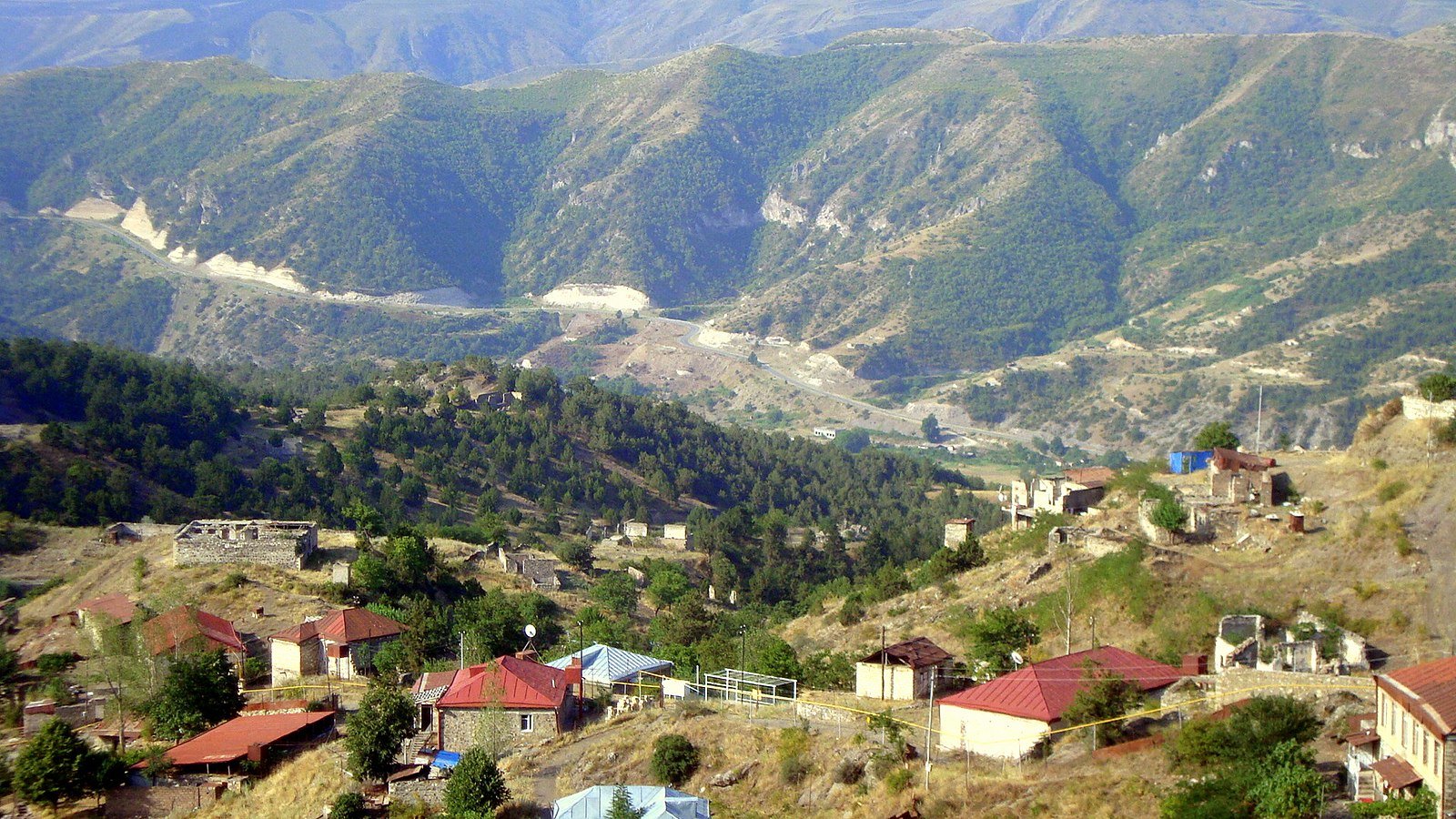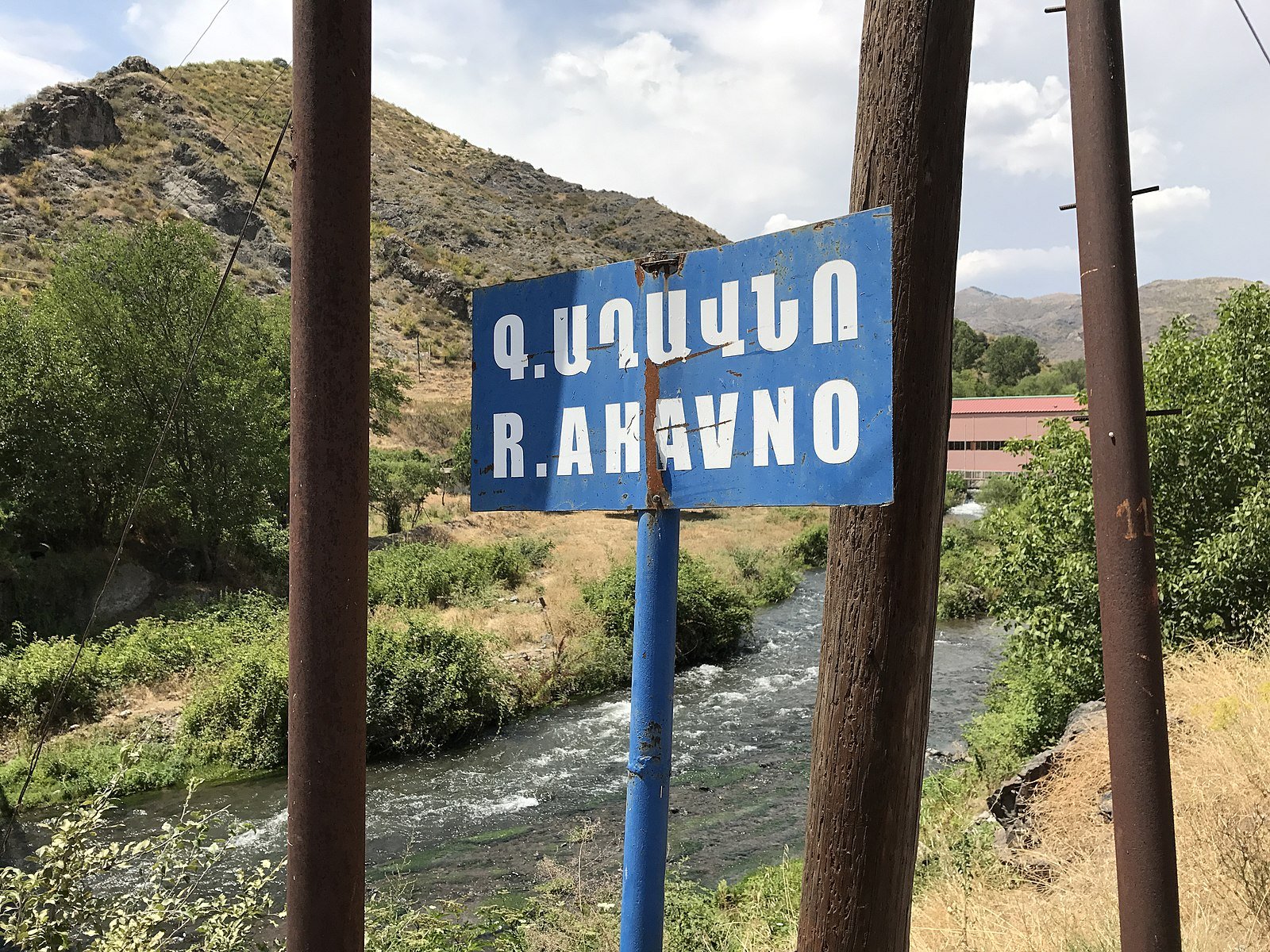
Artsakh authorities have ordered the evacuation of the Armenian residents of the villages of Aghavno and Nerkin Sus and the town of Berdzor, all located along the Berdzor (Lachin) corridor, by August 25.
On August 5, the Artsakh Minister of Territorial Administration and Infrastructure Hayk Khanumyan said that the settlements must be evacuated in 20 days “within the framework of a civilian defense plan.”
The Berdzor district was ceded to Azerbaijan after the 2020 Artsakh War, except for the Berdzor corridor. Under the terms of the ceasefire, Armenia and Azerbaijan agreed to construct an alternate route to the Berdzor corridor within the following three years, to which Russian peacekeepers would be redeployed. Pashinyan confirmed in late June that Aghavno, Nerkin Sus and Berdzor would be handed over to Azerbaijan after the construction of the new route.
On August 2, the day before Azerbaijan launched its most recent attacks on Artsakh, Artsakh authorities shared that the Azerbaijani side had demanded that Armenians halt use of the Berdzor corridor and “organize traffic via the new route in the near future.”
Secretary of the Armenian Security Council Armen Grigoryan responded that Azerbaijan’s claim was “not legitimate,” since no trilateral plan agreed upon by Armenia, Azerbaijan and Russia exists for the construction of a new route.
The Armenian Ministry of Territorial Administration and Infrastructure announced last week that construction of the Armenian section of the road will start this month. Meanwhile, during a phone call with French President Emmanuel Macron on August 5, Azerbaijani President Ilham Aliyev said the construction of the Azerbaijan portion of the route is nearly complete.
During a weekly cabinet meeting on August 4, Armenian Prime Minister Nikol Pashinyan reiterated that “no draft of such a plan has been proposed” to Armenia, although he said the Armenian government had proposed formulating a trilateral plan several times.
The Azerbaijani Foreign Ministry responded that Armenia has been informed for months about construction along the “agreed on route” and accused the Armenian government of delaying the implementation of their agreement.
Several critical pieces of infrastructure are located on the Berdzor corridor, including the natural gas pipeline that supplies Artsakh with its entire energy supply. Artsakh residents were deprived of heating and hot water for three weeks amid freezing temperatures in March after the Azerbaijani military prevented Armenian sapper groups from accessing a damaged section of the pipeline.
The announcement that the Armenian residents of Aghavno, Nerkin Sus and Berdzor must evacuate came days after two Armenian soldiers were killed and 19 injured in incursions launched by Azerbaijan on August 1 and August 3 across the line of contact with Artsakh.

The Ministry of Defense (MoD) of Azerbaijan admitted to the attacks, stating that it captured several strategic heights near Armenian villages close to the Berdzor corridor. The MoD of Azerbaijan said it launched operation “Revenge” in retaliation for the death of an Azerbaijani soldier earlier in the day.
The Russian peacekeeping contingent in Artsakh verified in its daily bulletin that Azerbaijan had violated the ceasefire on August 3. The chair of the EU Delegation for Relations with the South Caucasus Marina Kaljurand also said that Azerbaijan had violated the ceasefire and launched airstrikes by UAVs.
In his August 4 comments, Pashinyan blamed the Russian peacekeeping mission for failing to prevent the attacks. He said the latest incursions, as well as previous ceasefire violations committed by Azerbaijan in the zone of responsibility of the Russian peacekeepers, “raise questions among the Armenian public about the content and nature of the peacekeeping operation.”
The ceasefire agreement ending the 2020 Artsakh War stipulates the deployment of Russian peacekeepers along the line of contact between Artsakh and Azerbaijan as well as along the Berdzor corridor, presently the sole route connecting Armenia and Artsakh, for a five-year period. Moscow shared several drafts of a plan outlining the peacekeepers’ roles and responsibilities with Baku and Yerevan in December 2020 and February 2021, according to the International Crisis Group. Yet Baku rejected the plan on the basis that it wanted Moscow to clearly state that the territory on which the peacekeepers are stationed is in Azerbaijan.
In his comments on August 4, Pashinyan said that while Azerbaijan refused to sign the mandate detailing the mission’s scope of responsibility, the signatures of Armenia and Russia are sufficient to implement it. Otherwise, he called for the creation of an international mandate, without providing details as to what that would entail.
Pashinyan also addressed the demand by the Azerbaijani government that all Armenian forces must leave Artsakh, which the Azerbaijani MoD reiterated in its statement following the attacks.
“What are illegal Armenian armed units still doing on Azerbaijan’s internationally recognized territory? They should all have been withdrawn in line with Nov. 10, 2020 statement. Armenia didn’t do it and bears all responsibility for current tension in the region,” Azerbaijani diplomat Nasimi Aghayev tweeted on August 3.
Grigoryan said in mid-July that units of the Armenian armed forces would withdraw from Artsakh by September. However, Pashinyan said on August 4 that there are no servicemen from the Republic of Armenia in Artsakh.
“Today, Azerbaijan constantly talks about the Defense Army of Nagorno-Karabakh, why they are stationed along the contact line. If the Russian peacekeeping troops and Azerbaijan guarantee the integrity of the contact line, I think the Nagorno-Karabakh Defense Army will not have the need to carry out combat duty,” Pashinyan said.



Ah yes, the Russian program of “kapitulatzia” for Armenians and paradise for Turks and Azeris. In 1994, Russia forced Armenians to stop the offensive to save its loving baby Azerbaijan. In the Kremlin documents there was no “kapitulatzia” for Azeris where they had to leave the rest of the occupied territories of Artsakh.
In 2020, Russia orchestrated a fake “war” to humiliate Armenians and give victory to its loving baby Azerbaijan and steal Artsakh away again from Armenia for the second time in history. The war never even really started. No opportunity was given for any counter offensives, because Armenia had to sign the “kapitulatzia” outlining the most MORONIC conditions that Russia has come up with in its entire history.
And the purpose for giving up Berdzor? NO OTHER REASON THAN TO HUMILIATE ARMENIANS AND ISOLATE THEM! Our “ally” couldn’t even argue on behalf of Armenia that it is a stupid concept to give up one area and build another road from another area? Oh that’s right, silly me, this was actually Russia’s plan all along.
Armenia’s greatest misfortune was not Turkey or Azerbaijan. It was and is a vile evil state calling itself “Mother Russia”. We forgot their middle initial. “Mother F. Russia” is more accurate.
I see it the same way
And Armen Grigorian is absolutely right.
Let me cut to the chase, and be frank about it: the buck stops with PM Pashinyan; he lost the war against Azerbaijan; and, he capitulated to them. Under duress, PM Pashinyan made the wrong decisions, and he gave away the store. PM Pashinyan was defeated, and he lost his credibility, when that happened; regardless of whether he betrayed Armenia, he lost his credibility by losing a war, and then secretly giving away too much when he surrendered to the enemy.
So, PM Pashinyan is now a liability, an embarrassment, or even worse, and Armenia will be better off, the sooner that he’s gone. By the way, PM Pashinyan defunded Armenian Chess Grandmasters; now Grandmaster Levon Aronian might leave the country.
Laurence, When are you moving to Armenia and running for PM? What would be your first year and five year plans for turning the country around?
And so on and on efforts of ethnic cleansing continue.
Armenians are incapable of self-rule, especially in a violent and complicated place like the south Caucasus. This subject matter is therefore a waste of time and energy. Armenia’s natural place in the world today is with the Russian Federation. Armenia was resurrected in the early 19th century by the Russian Bear. For the past two hundred years, as well as for the past 30 yesrs, Armenia has been able to live in a violent, Turkic/Islamic neighborhood like the south Caucasus only because of its ties to the Russian Bear. Nevertheless, the post-Soviet years have revealed beyond any doubt that Armenians are NOT ready for self-rule or independence. The reality of the matter is that Armenia’s independence from Russia will only translate to Armenia’s dependence on Turkey. And if for any reason Russia decided to pull out of Armenia today, Armenia will disappear from the world map on the very next day, despite any effort by the diaspora. Armenians need to be mindful of the fact that on the global stage, the existence of an Armenia ONLY serves Russia’s and Iran’s interests and NO ONE else. Western powers, including the US, have been very detrimental to Armenia and Armenian society in general. If it is to recover from its post-Soviet ailments, Armenia must seriously limit its exposure to the toxic West. For better or for worst, Armenia is wed to Russia. Yerevan must deepen its ties to Moscow. Armenians need to start thinking about entering into a union with Russia. For better or for worst, Armenia must also maintain good relations with Iran. Armenia neglected it’s relations with Iran for the past 30 years. Yerevan must develop better ties with Tehran. All other so-called solutions or remedies for Armenia’s many ills today are simply a waste of time and energy.
@concerned armenian: what I don’t understand is both Azerbaijan and Georgia have built relations with the West since the end of the Soviet Union. Armenia is still stuck in the past and continues to double down on its relation with Russia.
When do we say enough is enough?